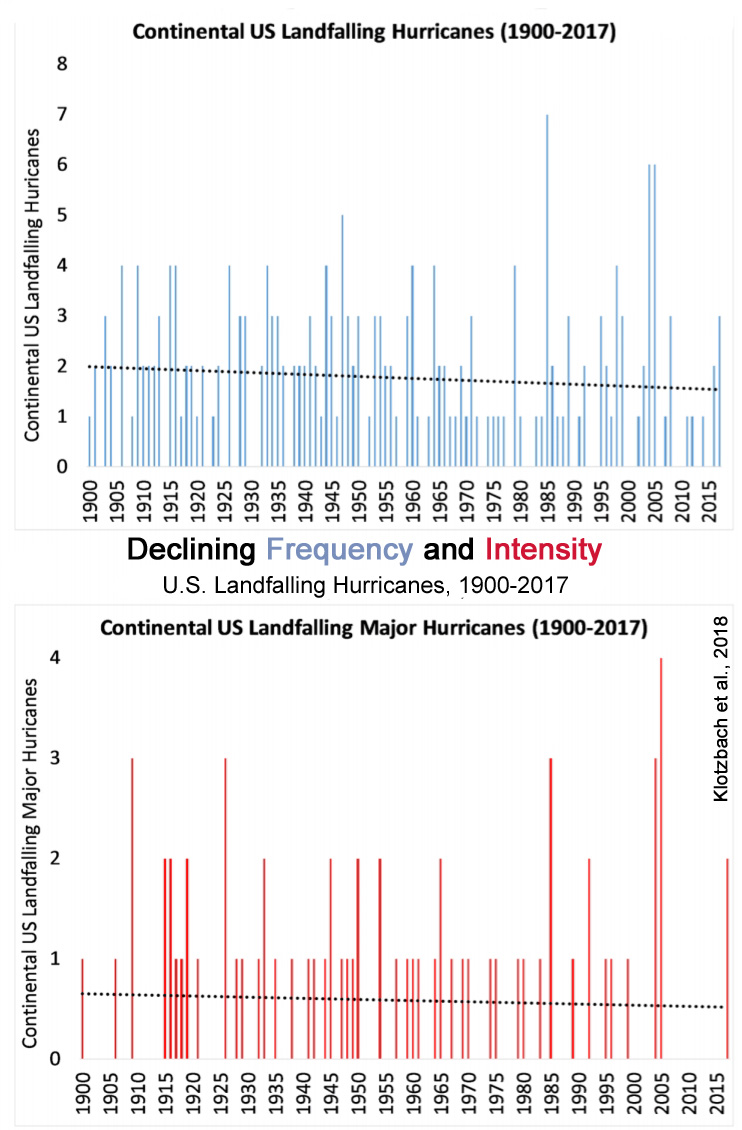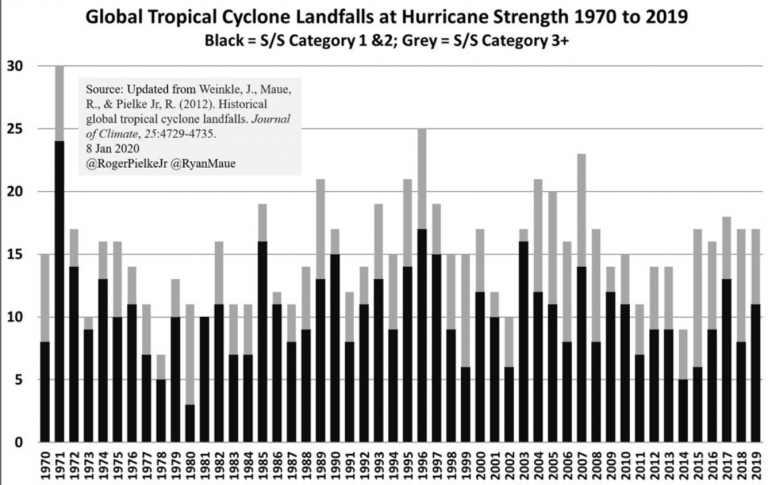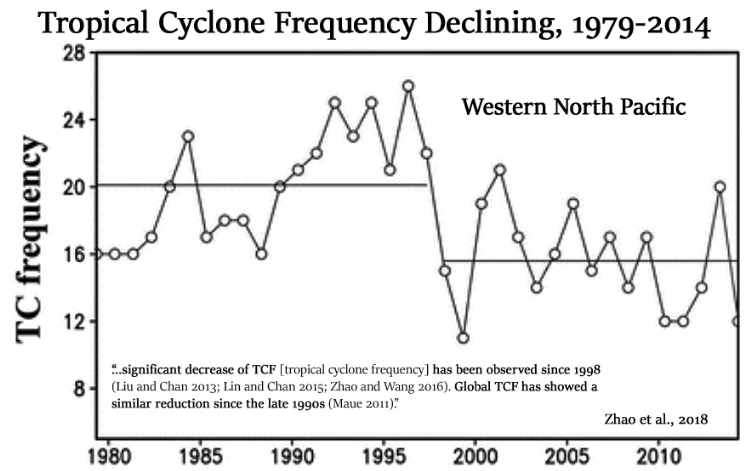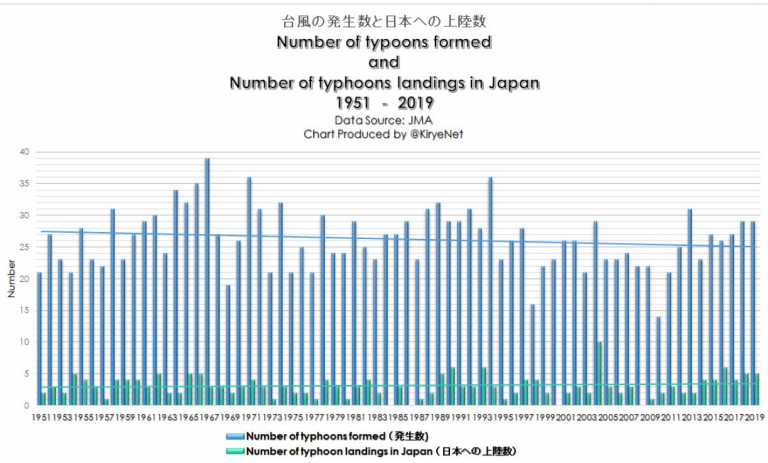If you repeat a truth often enough, then it stays that way.
Comprehensive analyses of data again show no link between rising CO2 and tropical storm intensity or frequency. It’s important to repeat that regularly.
The latest comes from statistics expert, Zoe Phin, who looks at the alarmists’ claim that increasing CO2 emissions are leading to more frequent and intense Atlantic hurricanes.
Alarmist claims cost nothing, and so easily made. Zoe Phin looks at whether the hurricane alarmist claim holds up.
Frequency
First Zoe looked at the (HURDAT2) data to find out if the first of the two claims (increasing frequency) is true. At first glance it would appear so.
But Zoe asks if the method of measuring the frequency really is sensible and if it maybe weren’t better to measure the amount of time the Atlantic spends in hurricane mode? To find out, Zoe plotted the hurricane hours data and the 10-year moving average:

Source: Zoe Phin.
From the data, Zoe concludes: “The amount of hours of hurricanes per year shows absolutely no trend!”
Intensity
Next she looks at the second claim: hurricane intensity is getting worse – thus potentially more destructive.
To find out Zoe sensibly uses the hurricane’s lowest pressure as a proxy. “The lower the pressure the more intense the storm.”
She plots the data for all the hurricanes, their corresponding lowest lowest pressure values:

Source: Zoe Phin.
No trend in 170 years!
There was an upward trend from 1970 to about 2005, but then intensity waned even as CO2 concentrations in the atmosphere climbed steadily. The peak level at about 2005 was very like in the 1920s, some 100 years ago when CO2 was much lower.
Zoe summarizes her findings:
There is absolutely no trend in hurricane intensity in nearly 170 years!
Clearly, climate alarmists are wrong in regard to Atlantic hurricanes.”
Confirmed by other independent results
Zoe’s results of course come as no surprise to those who look at the data.
Other leading scientists have reached the same conclusions: Hurricanes have not been getting stronger or more frequent. For example, Klotzbach et al (2018):
Or Dr. Ryan Maue on global cyclone activity since 1970, who cites Dr. Roger Pielke Jr.:
Or Zhao et al 2018 on western north Pacific cyclones:
Japan seeing downward cyclone trend
Another example comes from Japanese NTZ contributor, Kirye, who plotted the Japan Meteorological Agency (JMA) data on Pacific typhoons:
Data source: JMA
Alarmists obviously in la-la land
Clearly arguing with alarmists on this subject is a waste of time. The data are in and the results are pretty clear: CO2 is not driving much of anything, let alone typhoons.










“The latest comes from statistics expert, Zoe Phin,”
Thank you for not saying “Blogger Zoe Phin” like you did last time — I had complained about tha t. Ms. Phin is a scientist, whether she has a science degree, or not. And a real scientist, with skepticism, unlike many government bureaucrat “scientists” who start with a favored climate change narrative, and then try (unsuccessfully) to prove it. More important, I trust Mrs. Phin to be honest with the data she studies, and not make wild guess climate predictions, which seems typical of modern climate “science”. … I would never buy a used car from a government bureaucrat scientist!
As one comment here already covered, I would expect a rising trend of hurricane and typhoon counts, as satellites made counting easier. But I don’t see that trend with typhoons making landfall in Japan.
I follow over one dozen science and energy websites every day, from the US, Canada, England, Germany and Australia. This one is the best so far in 2021. My nitpicking is minor once again: That is a HUGE PHOTO of Mrs. Phin with the article. I can’t imagine such a large photo of any other scientist. Not that any other scientist looks like a model.
I don’t see the term “blogger” negatively at all. But I guess others do.
Thanks for your comment, both for its substance, and for the reminder of your name, which I sought while writing my comment but failed to see.
Politicians are inoculated against facts and reason. Then there are the big money folks that take in multi-millions promoting and feeding from the scam. Then there are those that need something on which to focus their need for esteem and self-actualization (See: Maslow – 5 Levels). There is overlap among these, with the core forming a Climate Cult.
But once in awhile a person does hear the truth.
I made this clear, for myself and any who read my blog, way back in 2012:
Hurricane, Tropical Storm Strengths 1851 – 2010
So the main point, by now, is (as underscored at the end of the post above, “Clearly arguing with alarmists on this subject is a waste of time.”
(One quibble, in passing: I don’t see the need for Phin’s “hurricane hours” to reveal the frequency of hurricanes. Surely one need look no further than the NUMBER of hurricanes each year for that… So she has a way to go to be a topnotch — master — scientist, in my view, whose credo is that of Strunk and White***: “Simplify, Simplify, Simplify!”)
***authors of “The Elements of Style”
Didn’t the United States set a mew record, with no major hurricanes making landfall, for many years after Katrina in 2005, which was blamed on “climate change”? That seems to have been forgotten.
Phin looks at existing data in new ways. She is inquisitive and skeptical — both important qualities for a real scientist. Hurricane hours is not going to win a Nobel Prize. So what? I can imagine many government bureaucrat “scientists’ would have somehow spun hurricane hours into proof of a coming climate change crisis. And those bureaucrats have advanced science degrees!
The number of hurricanes varies from year to year. And we’ve got perhaps 170 years of data, a tiny portion of this planet’s existence. We have satellite tracking, since the 1970s, likely to spot more hurricanes than in prior decades. And with this highly variable non-linear hurricane count, it seems that start and end years selected for a linear trend line could change the trend. And does a linear trend line even make sense for non-liner data?
In plain (American) English:
For any given period of time, the trend line of the number of hurricanes is likely to be up, or down. Does that linear trend line really tell us much?
I think including the strength of those hurricanes would be useful, like the ACE index. Although data may be questionable before the satellite age.
Not that any real hurricane data seem to matter these days, because we will be told one of the following, by those so-called government bureaucrat “master scientists”:
(1) CO2 is causing the number of hurricanes to increase, or
(2) CO2 is causing the number of hurricanes to decrease, or
(3) CO2 is causing the power of hurricanes to increase, or
(4) CO2 is causing the power of hurricanes to decrease, or
(5) CO2 is causing whatever is happening with hurricanes, and the trend is bad news (the climate can NEVER improve in the future — that’s the basic premise of climate alarmists, and don’t you forget it)
You wrote:
“Clearly arguing with alarmists on this subject is a waste of time.”
My own philosophy is similar:
“Arguing with leftists on ANY subject is a waste of time — they do not debate, they character attack — and they only change their minds to move further left”
I tell leftists I love global warming, here in Michigan USA, and want more. They get so confused that they usually change the subject. If that doesn’t shut them up about “climate change”, I tell them Trump was a great president, and they go berserk — their IQ drops about 50 points instantly. Cheap entertainment for me!
“Didn’t the United States set a mew record, with no major hurricanes making landfall, for many years after Katrina in 2005, which was blamed on “climate change”?”
Indeed – I believe the US went 11 yrs with a major (Cat 3-5) hurricane landfall.
[…] Reposted from The NoTricksZone […]
Hello, I would ask Zoe Phin to over lay the solar cycle of sun spots to her work and help us with even more good data.
I see that NOAA has named its first “tropical” storm of the year Ana. Seems they’ve either lost or thrown out the textbook on tropical storms. Ana formed in the central Atlantic, well north of the northern limit of where tropical storms form, as can be seen from these lecture notes.
http://www.atmo.arizona.edu/students/courselinks/fall14/atmo170a1s3/online_class/week_11/lect34_hurricanes_pt1.html
Desperate to pad their numbers, they are calling any storm a hurricane, even when it isn’t.
I’m kinda embarassed you enlarged my gravatar icon. I would prefer the use of my bio pic, if necessary. I need focus on my work, not on my face. I get enough of that wherever I go.
Otherwise, Thank You
Why embarrassed? It’s a very nice photo. But have changed it to the image at your blog.
Good move, IMO. The one you changed it to makes Zoe look more professional.
Re: HUGE photo:
It is not polite to say: “I told you so”
But I did tell you so!
Mrs. Phin:
As a professional nitpicker, I had already complained that you were called a mere “blogger” in an earlier article, and then about the huge picture in this article.
Thank you for being an honest, skeptical, inquisitive, climate scientist, without confirmation bias. Those characteristics have been rare among the climate PhD’s. And we don’t care what your face looks like.
[…] P. Gosselin, May, 22, 2021 in […]
[…] Doomsday Flat Out Refuted: 170 Years “Absolutely No Trend” In Hurricane Intensity/Frequency No Tricks Zone ^ | 5-22-2021 | P. […]
I didn’t realize clicking on Mrs. Phin’s name under her picture brought me to the home page of her website.
Perhaps every article here from another website should begin with the word “Source”, followed by the exact URL that gets readers directly to the home page of that website.
This is still the best climate science website of 2021, of over one dozen that I read every day.
Richard Greene
Semi-Professional Nitpicker
[…] Link: https://notrickszone.com/2021/05/22/cyclone-doomsday-refuted-170-years-absolutely-no-trend-in-hurric… […]
[…] CO2 Cyclone Doomsday Flat Out Refuted: 170 Years “Absolutely No Trend” In Hurricane Int… […]